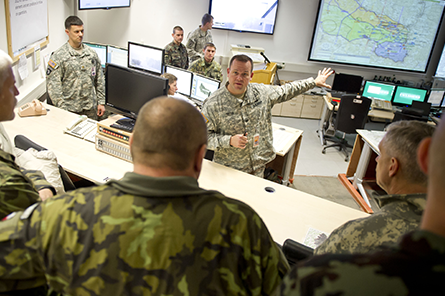Advancing WPS and gender perspectives in International Humanitarian Law
Despite recognition of the importance of gender perspectives in conflict and humanitarian response, there remains a significant gap between states’ normative commitments to Women, Peace and Security (WPS) and their practical application in military doctrine and operations governed by International Humanitarian Law (IHL).
Over 2025-2026, this project will create spaces for military legal and gender advisors, scholars, policymakers, gender experts and practitioners to collectively examine the integration of WPS and gender perspectives in IHL.
This project is supported by the Government of Liechtenstein.

Workstreams/Projects
This project’s cornerstone is the creation of a Community of Practice that brings together military legal and gender advisors, scholars, policymakers, gender experts and practitioners.
Peer exchange roundtables, both thematic and context-specific, will enable the Community of Practice to share emergent state practice, consider new and emerging challenges, and build professional collaboration. These will contribute to developing a series of Policy Briefs and a Compendium of successful approaches for implementation of WPS commitments in IHL aspects of military operations and model texts for potential incorporation in military manuals and doctrine.
Find out more in the project-dedicated factsheet: Advancing WPS and Gender Perspectives in IHL:Moving from Analysis to Implementation.
Thematic and country-level roundtables will examine specific issues pertinent to WPS, gender and IHL. Expert roundtables will enable Community of Practice participants to engage with key global experts, military and academic, and to share their own nation’s practices.
Find out more in the project-dedicated factsheet: 'Advancing WPS and Gender Perspectives in IHL:Moving from Analysis to Implementation'.
On 22 May 2025, DCAF convened an expert roundtable on “Integrating WPS and Gender Perspectives in Civilian Harm Mitigation Frameworks” as part of the UN Protection of Civilians Week. Co-organised with the Permanent Mission to the United Nations of Liechtenstein, the event brought together military, legal, and humanitarian experts to explore how gender perspectives and the Women, Peace and Security (WPS) Agenda can be operationalised in Civilian Harm Mitigation (CHM) frameworks.
This was the first expert roundtable of the new IHL Community of Practice on WPS, convened by DCAF as part of its programme on Advancing WPS and Gender Perspectives in IHL.
It aimed to:
- Explore the gendered dimensions of civilian harm in armed conflicts and the role of IHL
- Reflect on how CHM frameworks can be adapted to better account for the gender differentiated impacts of conflict
- Share good practices and operational lessons for mainstreaming WPS principles into CHM frameworks.
This roundtable represents a first step toward developing a repository of good practice and model language on IHL, gender and WPS to motivate and inform military doctrine, training and operational guidance.
The report of the event is available here: Integrating Women, Peace and Security and gender perspectives in civilian harm mitigation frameworks
In partnership with the ICRC, the development and publication of a Compendium of successful approaches in integrating WPS commitments and gender perspective in IHL aspects of military operations, with model texts for military manuals and/or doctrine.
Find out more in the project-dedicated factsheet: 'Advancing WPS and Gender Perspectives in IHL:Moving from Analysis to Implementation'.
On 21 May 2025, DCAF convened the side event “Where Protection of Civilians and Women, Peace and Security Meet” as part of the UN Protection of Civilians Week. The event was co-organised with the Permanent Mission to the United Nations of Liechtenstein, and co-sponsored by the Permanent Missions of Australia, Canada, Jamaica, the Philippines and South Africa, as well as the UN Department of Peacekeeping Operations, CIVIC, IPI, PAX and the Stimson Centre.
The event brought together nearly 100 participants, including diplomats and other state officials, military officers and legal, humanitarian and protection practitioners from within the UN system, regional organisations and civil society. It aimed to:
- Highlight the legal obligations under IHL for gender-responsive protection;
- Explore the gendered dimensions of civilian harm; and
- Share operational lessons and best practices for mainstreaming WPS principles into PoC policies and operations.
The report of the event is: Where protection of civilians and women, peace and security meet
DCAF provides technical advice to Troop and Police Contributing Countries (TPCCs) to help them implement the recommendations from their MOWIP reports, including in:
- Bangladesh, where DCAF partners with the Bangladesh Armed Forces and the BIPSOT to implement the key recommendations of the MOWIP report.
- Jordan, where DCAF partners with the Jordanian National Commission for Women to support the Public Security Directorate’s efforts to implement and report on their commitments connected to the Jordanian National Action Plan on Women, Peace and Security (JONAP II).
- Uruguay, where DCAF partners with RESDAL to support the Ministry of Interior in conducting a Gender Self-Assessment, based on DCAF’s methodology, and by providing capacity building for the National Police.
- Senegal, where DCAF partners with the REPSFECO and DIRCEL to implement the Sectoral Gender Strategy of the Senegalese Ministry of the Armed Forces.
- South Africa, where DCAF partners with the Institute for Security Studies, Department of International Relations and Cooperation within the Ministry of Foreign Affairs, National Defence Force and Police Service to champion and influence efforts to enhance women´s meaningful participation.
To learn more about how DCAF can support your institution in conducting or implementing a MOWIP and its recommendations, contact us at elsie@dcaf.ch
More National Reports:
Key Resources
Contacts
Megan Bastick, Gender and Security Fellow (m.bastick@dcaf.ch)

